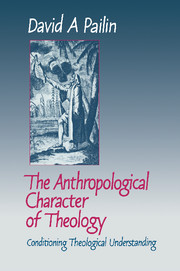Book contents
- Frontmatter
- Contents
- Preface
- 1 INTRODUCTION TO A STUDY OF THEOLOGY
- 2 FAITH, BELIEF, THEOLOGY AND REASON
- 3 GOD AS COSMIC PROJECTION
- 4 GOD AS ACTUALIZING REGULATIVE IDEAS
- 5 THEOLOGY AND RELIGIOUS EXPERIENCE
- 6 THEOLOGY AND THE APPREHENSION OF REVELATION
- 7 THEOLOGY AND HUMAN NEED
- 8 THEOLOGY AND THE COMPLETION OF UNDERSTANDING
- 9 CONCLUSION
- Notes
- Select bibliography
- Index
2 - FAITH, BELIEF, THEOLOGY AND REASON
Published online by Cambridge University Press: 26 August 2009
- Frontmatter
- Contents
- Preface
- 1 INTRODUCTION TO A STUDY OF THEOLOGY
- 2 FAITH, BELIEF, THEOLOGY AND REASON
- 3 GOD AS COSMIC PROJECTION
- 4 GOD AS ACTUALIZING REGULATIVE IDEAS
- 5 THEOLOGY AND RELIGIOUS EXPERIENCE
- 6 THEOLOGY AND THE APPREHENSION OF REVELATION
- 7 THEOLOGY AND HUMAN NEED
- 8 THEOLOGY AND THE COMPLETION OF UNDERSTANDING
- 9 CONCLUSION
- Notes
- Select bibliography
- Index
Summary
Before we consider the factors conditioning theological understanding, it is important to clarify what is meant by the basic concepts of faith, belief, theology and reason, and to outline how they are related to each other. It is not intended to present a comprehensive description of the variety of ways in which these notions are used in practice but to indicate, by reference to a set of actual usages appropriate to the theological position to be examined, how these key concepts are understood in this study.
The nature of faith
‘Faith’ refers to the stance, understanding and disposition which constitute a person's existential commitment. It includes assent to a particular apprehension of the fundamental character of reality, the acceptance of certain values contained within that apprehension as normative, and the adoption of correspondingly appropriate forms of activity. It embraces these different factors not as distinct components but as interdependent facets of a single whole.
As a matter of commitment, faith involves risk. It is an affirmation of what can never, in its material content, be indisputably demonstrated. This does not mean that those who have faith will typically feel anxious or hesitant about it. As Tillich suggests, the ‘doubt’ that belongs to faith is ‘not a permanent experience within the act of faith’ which is expressed in a specific psychological state. It is rather to be regarded as a characteristic of the logical structure of faith, which results from the tension between the relativity of those who affirm it and ‘its unconditional character’.
- Type
- Chapter
- Information
- The Anthropological Character of TheologyConditioning Theological Understanding, pp. 8 - 30Publisher: Cambridge University PressPrint publication year: 1990



